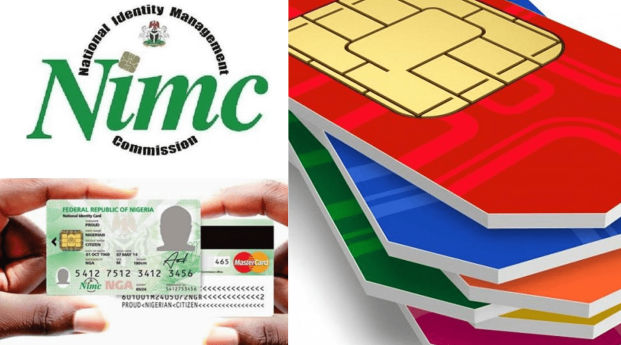Telecom
NIN-SIM Linkage: Protest Not Why MTN, Glo, Airtel and 9mobile Bar Subscribers’ Lines

Telecommunication operators in Nigeria, particularly MTN, Globacom, Airtel and 9mobile have started barring subscribers’ lines.

Investigation on Sunday shows that the telcos’ actions are based on the disconnection timelines set by the industry regulator to bar subscribers who are yet to link a national identification number (NIN) to their Subscriber Identity Module (SIM) card(s).
Result of the investigation is contrary to the claims in some quarters that the telcos are barring subscribers’ lines as part of government’s agenda to scuttle the proposed national protests.
The history of NIN-SIM linkage dates back to 2020
You would recall that mobile networks based on a December 2023 directive from the Nigerian Communication Commission (NCC) had barred subscribers who had not submitted their NINs for verification as of February 28, 2024.
In addition, a second set of subscribers with five or more SIM whose NINs failed verification were also fully barred on March 29, 2024.
There have been several deadlines given in the past on the cut-off date for SIM cards not linked to NINs, the last deadline for July 31, 2024 was planned to be definitive as shown from the strict adherence to the previous deadlines in February and March this year. This decision was reached long before the planned protests.
The telecom regulator had embraced a phased SIM barring approach, as the directive for disconnection is being rolled out in stages.
The compulsory NIN-SIM linkage began in December 2020 when the government directed telecommunication companies to block calls from unregistered SIM cards and SIMs that are not linked to NIN.
Despite the extension of deadlines, many phone lines are yet to be linked with verified NINs.
Three years later, the issue of SIM-NIN linkage continues to have hitches, especially from the behavioural side of telecom consumers.
The Commission had set April 15, 2024, for the full network barring of the subscribers with four or fewer SIMs with unverified NIN details.
This deadline was moved by NCC to July 31, 2024, to give telecommunications consumers more time to ensure their submitted NIN details are properly verified.
The date of July 31, 2024, was set as the last date since April in well-publicised news and notices by the NCC.
Why NCC insists on NIN-SIM linkage
The NCC’s seemingly hard-line position hinged on its objective to clean the country’s SIM ownership database and enhance national security.
At a forum in Lagos, long before the planned nationwide protests, Dr. Aminu Maida, the executive vice chairman of NCC, expressed NCC’s commitment to ensuring that criminals do not take advantage of having multiple unlinked SIMs to carry out their nefarious activities.
Not linked to Planned National Protests
A source at the Ministry of Communications, Innovation and Digital Economy, disagreed with social media users who accused the telcos of being used by the government to scuttle the planned national protests.
“This accusation about MTN or others barring people from its network is unfair, mischievous, and dangerous.
“Other networks have been disconnecting subscribers based on the extant policy in this regard. Airtel, Glo, and 9mobile, Smile Communications, VDT, etc., have been disconnecting non-compliant consumers, long before planned protests”.
“The NCC is considering extending the deadline against its wish, but that idea also came long before the scheduled protests.
“Nigerians need to demonstrate that they can reason and recall incidents and social issues and not allow themselves to be misled by those who are bent on bringing Nigeria down.
Telecom
Paradigm Initiative Champions Digital Rights and Inclusion at Africa IGF 2025 in Dar es Salaam

Paradigm Initiative (PIN) has reaffirmed its commitment to advancing digital rights and inclusion across Africa following its active participation in the 2025 Africa Internet Governance Forum (AfIGF), held in Dar es Salaam from May 29 to 31.

The forum convened diverse stakeholders from governments, civil society, the private sector, and academia to explore pressing internet governance issues under the theme “Building a Resilient Digital Ecosystem that Supports Africa’s Sustainable Growth and Global Leadership.”
PIN’s delegation contributed to conversations around digital security, digital rights and inclusion policy and compliance, emerging technologies, global governance, highlighting digital threats and making recommendations for an inclusive and rights-respecting digital landscape. Drawing from its research and advocacy efforts across the continent, the organisation offered practical policy recommendations aimed at fostering an open, secure, and human rights-respecting digital environment.
“The Africa IGF continues to serve as a critical space for shaping Africa’s digital future. We were pleased to contribute insights and amplify the urgent need for inclusive and rights-centric digital governance,” said ‘Gbenga Sesan, Paradigm Initiative’s Executive Director.
During the forum, PIN hosted and participated in multiple sessions, including: A panel on protecting civic space online, a workshop on bridging the digital divide through inclusive policies, and bilateral meetings with regional and global partners on shaping digital governance frameworks in the lead-up to key global internet governance conversations.
PIN’s presence at the AfIGF 2025 not only spotlighted emerging digital threats but also underscored its commitment to ensuring that all technological advancements and policies globally translate into greater digital freedoms and opportunities, not restrictions.
As part of its ongoing advocacy, the organisation will continue to engage with stakeholders across sectors to ensure that digital transformation in Africa is anchored in rights, equity, and inclusion.
Telecom
MTN Nigeria Unveils 21 Days of Y’elloCare to Empower Communities through Digital Tools

MTN Nigeria today held the opening ceremony for the 2025 edition of 21Days of Y’ello Care, the company’s annual employee volunteerism initiative.

This year’s campaign, themed “Connecting at the Roots – Connecting Communities through Digital Tools,” will run from June 1 to June 21, 2025, and focuses on supporting communities that continue to face barriers to digital access and connectivity.
MTN Nigeria kicked off on Sunday June 1 with trainings across different locations in Lagos where staff of the company volunteered to delivered training in valuable areas such as digital marketing and personal branding and employability skills.
In line with the Group-wide campaign theme, MTN Nigeria is implementing a series of grassroots initiatives aimed at expanding digital inclusion and connectivity in underserved areas.
Planned activities include equipping schools and community youth centres with devices, digital literacy workshops, deployment of community Wi-Fi access points, support for digital entrepreneurship and the establishment of an all-in-one Y’ello Pods across the country that will provide a digital hub for learning and support financial inclusion.
Speaking at the opening ceremony held in Lagos, Karl Toriola, Chief Executive Officer, MTN Nigeria said, Y’ello Care matters to us because we’re a digital company and we’re operating in an environment where there are so many needs. At MTN Nigeria, we care, and we want to show our direct connection and responsibility to the communities we operate in.
Now in its 18th year, Y’ello Care is a groupwide flagship MTN employee volunteering initiative that encourages MTNers to volunteer their time and expertise to support positive social change.
The campaign reflects MTN’s purpose to enable the benefits of a modern connected life for everyone and is anchored in the company’s core values.
In 2024, in a remarkable demonstration of corporate volunteerism, MTN staff, through the Y’ello Care initiative, reconstructed a school block at Iwerekun Community High School, Lakowe. This effort has restored hope and significantly improved learning conditions for both students and teachers.
For further information, updates on “21 Days of Y’ello Care”and MTN Nigeria’s commitment to social development, please visit yellocare.ng or follow us on social media.
Telecom
Google’s Open Buildings Data Empowers Africa’s Health and Climate Progress

Fresh, on-the-ground evidence from health planners and climate analysts in Rwanda, Nigeria and South Africa shows how the Open Buildings dataset, which maps more than 1.8 billion structures, is helping frontline projects close service gaps and strengthen community resilience.

Across the continent, artificial-intelligence tools are graduating from pilots to public-service workhorses, powering everything from crop-price forecasts to live language translation. Open Buildings—developed by researchers at Google Research Africa—is part of that shift, proving that open, locally guided AI can turn sparse data into timely decisions without locking African problem-solvers behind paywalls or proprietary gates.
In Rwanda, the Ministry of Health and Kigali-based Sand Technologies resited rural clinics with help from the dataset. Their new blueprint aims to bring 92% of citizens within a 30-minute reach of care, trimming journeys that put mothers and newborns at risk.
Across Northern Nigeria, epidemiologists at AFENET and geographers from WorldPop uncovered 10,250 buildings, guiding vaccinators who reached 70% of the zero-dose and under-immunized children identified through the mapping in just six months.
Meanwhile, the World Resources Institute (WRI) has already applied this flood-risk modelling in Dire Dawa, Kigali, Musanze, Gqeberha and Johannesburg, combining two-dimensional hydraulic simulations with building footprints to create block-by-block exposure maps.
The need is pressing: Nairobi is still recovering from the May 2024 floods that displaced more than 278 000 residents, while Johannesburg’s rapid growth along the flood-prone Jukskei River continues to heighten vulnerability
These projects tackle challenges felt across the continent. Africa still has about 8.7 million “zero-dose” children who receive no routine vaccines each year, while the urban population is projected to almost double to nearly one billion people by 2035— forcing new homes into high-risk floodplains and informal settlements.
By giving ministries, city engineers and NGOs a street-level view of where communities are growing and how they change over time, the Open Buildings dataset lets limited budgets flow to the people and places that need them most.
Dr Aisha Walcott-Bryant, Research Scientist & Head, Google Research Africa, “These projects show what happens when local expertise meets open, scalable technology: mothers reach clinics sooner, children receive long-overdue vaccines, and city planners get ahead of the next flood.
“We’re thrilled to stand beside partners who turn data into decisive action, proving that AI’s highest calling is to solve real-world challenges.”
From lifesaving clinics to climate-smart cities, these projects show how open AI is fast becoming Africa’s quiet engine for equitable progress.
The Open Buildings dataset—along with sample code, tutorials and its new 2.5D layer—is freely available at g.co/openbuildings.

 E-Business3 days ago
E-Business3 days agoFarmers to Get Identity Card for Loans, Inputs

 Telecom3 days ago
Telecom3 days agoARCON Probes 9mobile over Alleged N1Bn Advertising Debt

 News2 days ago
News2 days agoJAMB Waxes Worriedly over Rising Digital Exam Fraud

 News3 days ago
News3 days agoSERAP Sues NNPC over Alleged Missing ₦500Bn, Seeks Accountability

 E-Business2 days ago
E-Business2 days agoNIMC Plans to Register 95 Percent Nigerians by December

 Telecom2 days ago
Telecom2 days ago9mobile Nigeria Inks Agreement to Roam with MTN

 Telecom2 days ago
Telecom2 days agoBanks, Telcos to Start Deducting USSD Charges from Airtime Today

 E-Business3 days ago
E-Business3 days agoDyna.Ai Launches Operations in Nigeria














